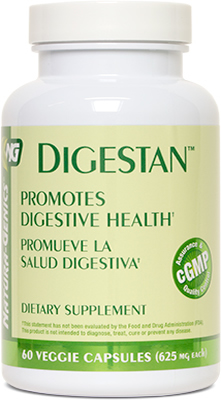60 Veggie Capsules • 625 mg
Slippery Elm is native to North America and the inner bark of the tree is the main part used in the nutraceutical industry. The mucilage of slippery elm
gives the soothing effect for which it is known. In people with indigestion,
the mucilage appears to act as a barrier against damaging effects of acid on
the esophagus. Slippery elm might promote an anti-inflammatory effect locally in the stomach and intestines.
Peppermint is classified as a carminative herb and has been used as a general compound to promote digestive health. Its oil inhibits and relieves intestinal gas. It may also promote the relief of intestinal spasms.
Ginger has been used in traditional Chinese medicine for over 2,500 years.
It promotes digestive function effectively. The dried rhizome contains approx-
imately 1 to 4% volatile oils. These are the active constituents of ginger responsible for ginger’s characteristic odor and taste. The aromatic constituents include zingiberene and bisabolene, while the pungent constituents are known as gingerols and shogaols. The pungent constituents are credited to promote the anti-nausea and anti-vomiting effects.
Catnip has been used in humans to produce a sedative effect and also to promote the reduction of gas, acting as a digestive aid. The volatile oil in catnip contains monoterpene and nepetalactone.
Chamomile has been used for centuries in Europe as a therapeutic plant, mostly for gastrointestinal complaints. The flowers of chamomile contain 1 to 2% volatile oils including alpha-bisabolol oxides A & B, and matricin (usually converted into chamazulene). Other active constituents include the flavonoids apigenin, luteolin, and quercetin. These active ingredients contribute to this compound to promote anti-inflammatory, antispasmodic, and stomach-muscle relaxing activity, particularly in the gastrointestinal tract.
Fennel is used in many cultures after meals to promote the inhibition of gas and upset stomach. The major constituents, which include the terpenoid anethole, are found in the volatile oil. Anethole and other terpenoids promote the inhibition of spasms in smooth muscles, such as those in the intestinal tract, and this is thought to contribute to fennel’s use as a carminative
(gas-relieving and gastrointestinal tract cramp-relieving agent).
Fenugreek grows today in many parts of the world. The seeds are used therapeutically. This compound contains alkaloids (mainly trigonelline)
and protein high lysine and L-tryptophan. Its steroidal saponins (diosgenin, yamogenin, tigogenin, and neotigogenin) and mucilaginous fiber are thought
to account for many of the beneficial effects of fenugreek.
Papaya leaves are high in beta-carotene, calcium, carpaine, fats, flavonoids, niacin, tannins, and vitamin C. Unlike the fruit, it is not a source of the protein-dissolving enzyme papain. Physicians of nineteenth century America used papaya leaves to promote digestive health and to inhibit bloating, gas, nausea, and flatulence.
Aloe comes originally from Africa. It has been historically used for many of
the same conditions for which it is used today, particularly for the skin and digestive conditions. The constituents of aloe latex responsible for its laxative effects are known as anthraquinone glycosides. These molecules are split by the normal bacteria in the large intestines to form other molecules (aglycones), which exert the laxative action.
Papain is a proteolytic enzyme from the cysteine proteinase family. It functions by breaking down bonds in proteins and helps to remove weak or damaged protein bonds. These weak or damaged bonds may cause discomfort. Papain is able to support the body’s natural tissue protection process by promoting the maintenance of healthy proteins.
Bromelain is a sulfur-containing proteolytic digestive enzyme that is extracted from the stem and fruit of the pineapple plant. Bromelain supports digestion of proteins and also promotes anti-inflammatory activity.
| Supplement Facts | ||
| Serving Size: 1 V. Capsule | ||
| Servings per Container: 60 | ||
| Amount per 1 V. Capsule | %DV* | |
| Proprietary blend | 625 mg | |
| Slippery Elm Bark (Ulmus rubra) | * | |
| Peppermint Leaves (Mentha piperita) | * | |
| Ginger Root (Zingiber officinale) | * | |
| Chamomile Flowers (Matricaria recutita) | * | |
| Catnip Leaves (Nepeta cataria) | * | |
| Fennel Seeds (Foeniculum vulgare) | * | |
| Fenugreek Seeds (Trigonella foenum-graecum) | * | |
| Papaya Leaves (Carica papaya) | * | |
| Aloe Leaves (Aloe ferox) | * | |
| Papain (6000 USP) | * | |
| Bromelain (2000 GDU) | * | |
| *Daily Value not established | ||
Other Ingredients: Vegetable capsule.
Recommendations: As a dietary supplement, take one (1) capsule daily.
Caution: Do not use this product if pregnant or nursing. Do not use
this supplement if the band around the cap is broken or missing.
If symptoms persist, consult a doctor. Keep this product out of reach
of children.
Storage: Keep tightly closed in a dry place and do not expose to excessive heat.
The statements above have not been evaluated by the Food and Drug Administration (FDA).
This product is not intended to diagnose, treat, cure or prevent any disease.





